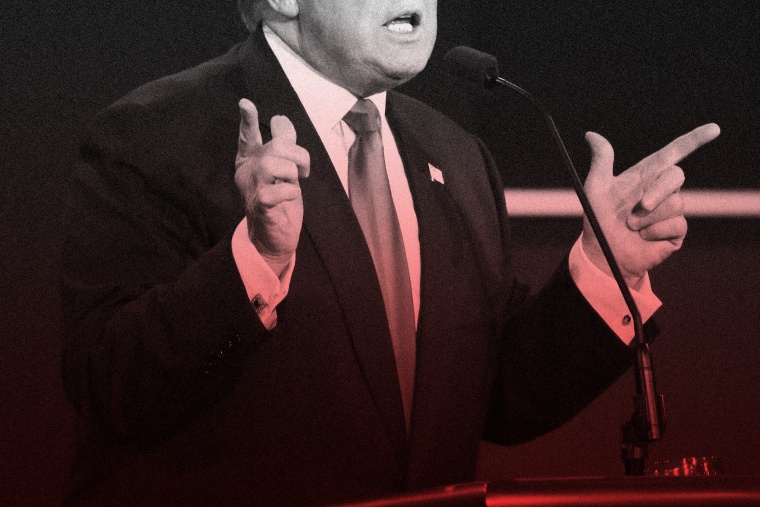One's a bombastic performer who knows how to seize the spotlight, while the other is a seasoned debater who'll be prepared for a fight.
As President Donald Trump and former Vice President Joe Biden head into Tuesday night's first presidential debate in Cleveland, debate experts told NBC News both bring wildly different skills to the stage that they can use to their advantage — or peril.
Trump is "a performer. He's full of energy," said Susan Millsap, a communications professor at Ohio's Otterbein University. "Biden is much more of a planned and conscientious type of debater. When you have those two things together, the clash is going to be there. The real test is going to be who pulls the other one off their game."
While Biden participated in 11 debates against a wide array of opponents during the Democratic primary, he's never faced anyone quite like the president.
The experts who spoke to NBC News all predicted Biden would come better prepared to tackle the evening's six topics over 90 minutes: the Trump and Biden records, the Supreme Court, Covid-19, the economy, race and violence in American cities and the integrity of the election.
They also said Biden's years of experience on the debate stage give him an advantage — along with Trump's characterizations of him as "sleepy" and addled.
Mitchell McKinney, director of the Political Communication Institute at the University of Missouri, said Trump has lowered the bar for his own performance as well, with his frequent over-the-top insults about Biden and the Democrats, and that could work to the president's advantage.
"Name-calling, bullying — in some ways Trump has created this expectation, where we start to expect that behavior from him," McKinney said. "If there are unpresidential moments, people now just kind of ignore it."
The same cannot be said for Biden. A gaffe or a blunder could feed into Trump's caricature of him, McKinney warned.
"He has to avoid a Rick Perry 'oops' moment," he said, referring to the former Texas governor drawing a blank on what federal agency he planned to eliminate during a debate in the 2012 Republican presidential primary. A similar gaffe by Biden could cost him voters who are on the fence about supporting him because of his age.
"It's Biden's job to show up and have an aggressive debate performance where he'll put those concerns to rest," McKinney said.
Millsap said Biden needs to stay focused and not let Trump get under his skin.
"When he gets angry, he starts talking quickly, his stutter comes in and he loses focus," he said. "He has to retain focus and come across as presidential."
Todd Graham, director of debate at Southern Illinois University, noted that during the Democratic primary face-offs, it would take him several minutes to cool down after he got mad about something.
"He sometimes doesn't know how to rein it back in," Graham said, adding that when he's still fuming while answering later questions, "he comes across as an angry man, instead of having had righteous indignation."
The experts all warned that Biden shouldn't spend much time fact-checking Trump.
"If Biden decides he's going to fact-check Trump, he's not going to have time for anything else. He'll never get to his offense," Graham said, adding that studies have shown "if a debater tries to fact-check an opponent, they're not only typically unsuccessful, but it's more likely to backfire."
"It turns people off," Graham said.
But Millsap said a bit of fact-checking could throw Trump off his game.
"Trump drives me crazy as a debate coach because he will use an unsupported claim to support another claim," Millsap said. "When he speaks to his base or at rallies, people want to believe it. In a debate, I'm thinking it’s not going to be as successful because you can have someone correct you."
“It could throw him for a loop,” Millsap said, but noted that Trump also knows how to "deflect with blame."
Trump is also less at risk during the face-off because he doesn't seem to be trying to court new voters for himself; he's likely to be more focused on getting people not to turn out for Biden.
"As a public speaker, he has a style that's good for his base but doesn't draw in others," Millsap said. "Biden has to show this is important — you've got to vote. In that way, he kind of has the higher burden."
McKinney said Biden just "needs to be disciplined and ready. In terms of message, his job is to say Trump doesn't deserve four more years and then, when he's attacked, to be able to skillfully and aggressively handle the attacks."
Trump, meanwhile, could get himself in trouble if he goes too overboard with his verbal assaults, Graham warned.
"I'd ask him to rein in the hyperbole a little bit," Graham said.
He said studies have shown that outrageous claims, like Trump saying Biden's going to kill the suburbs and will "hurt God," tend to have the opposite of the intended effect.
"People then think it's ridiculous, and 'Biden's not that bad,'" Graham said.
Otherwise, the president will likely be prepared for Biden's attacks.
"It's harder to throw him off of his game," Graham said. "He knows how to go in for the kill."

